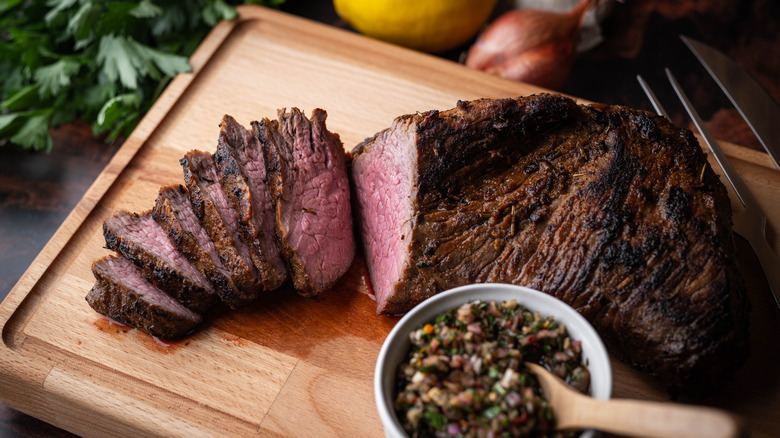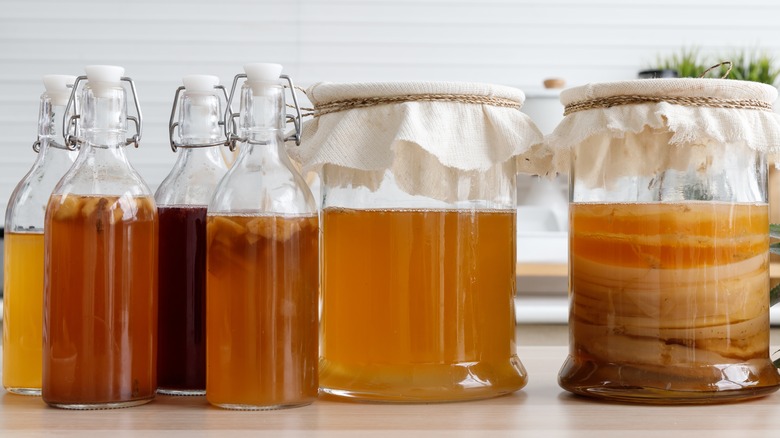Kombucha Is The Unexpected Way To Elevate And Tenderize Steak
No matter how immune you think you are, everyone's fallen for at least one enticingly healthy and ritualistic fitness fad. Exhibit A: the forgotten Thigh Master stuffed high on a closet shelf since the 90s. Exhibit B: the dusty pair of roller skates you bought in 2020 (because, let's be honest, what else was there to do?). And lastly, Exhibit C: bottle upon bottle of unopened kombucha clogging your fridge.
It's okay. We all go through a kombucha phase. This bubbly fermented drink made from organic components such as yeast and bacteria became wildly popular at the turn of the century. It was touted as a soda dupe and a nutritional source of vitamins and minerals that could prevent illness. Unfortunately, there has yet to be a genuine scientific connection, but there is proof that it can be made into a fantastic marinade for your next steak dinner.
Homemade marinades require a certain level of acidity to tenderize the meat. They must also be sweetened, have an overt natural flavor, and contain a douse of oil to effectively retain moisture. And while they aren't a necessary part of grilling, they are a tasty one that can completely change the outcome of your dinner. But how does kombucha play a role in your next barbecue soiree, you may ask? It's an excellent meat tenderizer that can provide flavors incomparable to lemon juice or red wine vinegar.
Fermented marinades should start replacing traditional ones
Many trusty meat marinades contain Worcestershire sauce, lemon, and honey — give or take a splash of soy sauce. Sure, these are reliable household ingredients, but do they offer anything spectacular? Everyday tenderizers can become dull over time. If you feel like your ribeye steak could use a shake-up, try experimenting with fermentation.
While many active ingredients have yeast in them, virtually everything has bacteria. Over time, these two cause a substance's chemical makeup to change and disintegrate. Think grapes and wine or a heaping scoop of strawberry yogurt. Once a food or drink has been fermented, it may include traces of alcohol or become carbonated (due to yeast transforming sugar into carbon dioxide). This same logic applies to kombucha.
When meat rests in a fermented marinade, like kombucha, the bacteria and yeast can effectively break down the muscle and tissue inside the cut. And with added flavors such as grapefruit or mango, it can permeate your T-bone steak with a surprisingly delicious twist. Allow the meat to marinade with seasonings and oil for up to 20 minutes. If you choose to leave it alone for a few extra, that's fine, but be cautious of over-marinating. Your food is essentially being pre-digested, so it's important to keep an eye out. Still, this tea can be used for more than just marinating. It may be the one everyday ingredient you're missing.
Try substituting wine for kombucha in sauces
Kombucha is a wonderful ingredient to liven up any family recipe. It can be used like vodka or wine to add a dash of something special to a dish. However, it should not entirely replace other liquids your recipe may call for. If you need chicken broth or vegetable stock, or even a cup or two of water, these still need to be included. Otherwise, you could end up with something that doesn't quite tickle your fancy.
When making a creamy pasta sauce, add a drizzle of kombucha to the pan once the veggies are cooked. Then, reduce as you would with wine before adding cream, cheese, seasonings, and noodles. The added kombucha will offer a zesty bite to the meal, unlocking newfound flavors that would have otherwise been concealed. If you're concerned about the smell or taste of vinegar affecting the profile of your pasta, there's no need to fret. As with wine, the heat neutralizes these notes and makes them work with added ingredients rather than against them.
If you've used kombucha as a marinade and still have a bit leftover, there is an easy way to turn it into barbecue sauce. Add your seasonings, sugar, tomato sauce, and kombucha to a jar and let it ferment on the counter for a few days. Upon opening, a strong (but pleasant) vinegar smell will arise. This is a small part of fermentation but should subside in a few days.


